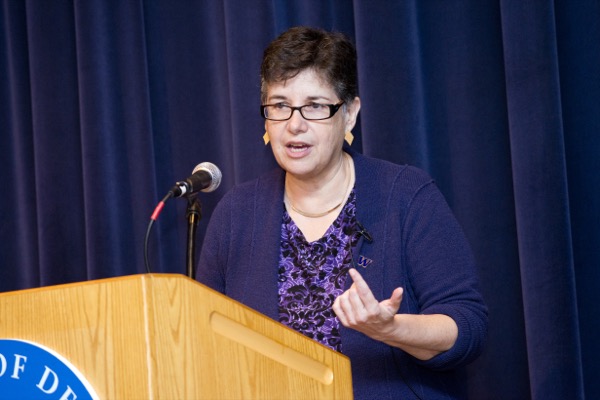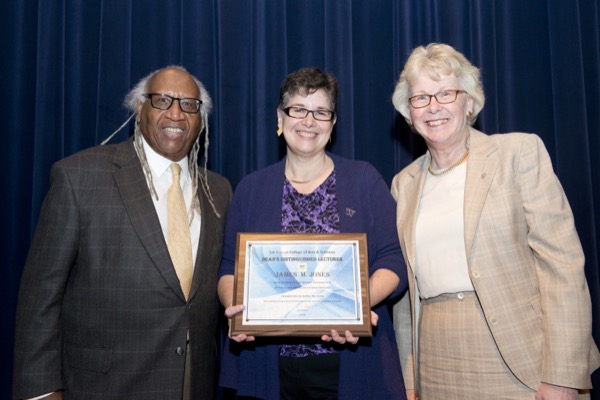


Discussing diversity
Higher education leader says universities can promote understanding, inclusiveness
3:22 p.m., April 26, 2016--Universities are “the perfect place” to have the difficult, often uncomfortable, conversations that are needed to combat instances of bias, racism, sexism and violence that have drawn attention across the U.S. in recent years, Ana Mari Cauce told an audience at the University of Delaware.
Cauce, who is president of the University of Washington, delivered the spring 2016 Distinguished Lecture on Diversity in Higher Education on April 22 at UD. She told those attending the talk that, although the past two years have been “a really tough time” for those who value diversity and inclusiveness, she is hopeful because incidents of bias have often been met by resistance.
People Stories
'Resilience Engineering'
Reviresco June run
“Student leaders have stood up to racism and bias” when those instances occur on and off campus, Cauce said. Students have been having discussions about the issues, taking action and remaining engaged, she said, and universities across the country have been talking seriously and working to promote diversity.
“We’re all struggling, but I’m impressed by what the University of Delaware is doing,” Cauce said as an example. “You’re sending a very clear message that diversity really does matter.”
She described national surveys of college students that show they clearly value diversity but also feel that they have a lack of knowledge about other races and cultures. The reason may be that young people today were raised with the idea that they could be “color blind” to race and other differences and that they should treat others as if everyone were the same, she said.
But that’s not realistic, Cauce pointed out, because people have different experiences and frames of reference that must be acknowledged in order to understand them.
“We can’t address our biases by pretending they don’t exist or that they ended in the past,” she said. She urged students and others in the community to speak up when they hear offensive language or jokes and to work to understand their own stereotypes and prejudices — something she said no one can avoid having in our society.
As a psychologist, Cauce said, she knows that people can learn new ways of thinking: “With time and effort, habits and thought processes can change.”
More about Ana Mari Cauce
Cauce, who became Washington’s 33rd president in 2015, has championed access to higher education throughout her career.
Raised in Miami after emigrating with her family from Cuba, she earned a bachelor’s degree in English and psychology from the University of Miami and a doctorate in psychology, with a concentration in child clinical and community psychology, from Yale University.
She has been a member of the University of Washington faculty since 1986, after three years as a faculty member at UD. At Washington, she previously served as provost and executive vice president.
In introducing Cauce at the lecture, James M. Jones, professor of psychological and brain sciences and of Black American studies, as well as director of UD’s Center for the Study of Diversity, described her as “a student, a colleague and a friend” for the past 35 years.
“Although her stay at the University of Delaware was short — three years — we claim her as our own,” Jones said.
More about this lecture series
The talk was the latest in a series of lectures sponsored by the Center for the Study of Diversity. The series is designed to bring eminent academicians to campus to share with the community ideas on how to embrace diversity and inclusiveness at colleges and universities.
The final lecture in this semester’s series will take place at 4 p.m., Thursday, May 5, when Scott Page of the University of Michigan will speak in Gore Recital Hall of the Roselle Center for the Arts.
The Leonid Hurwicz Collegiate Professor of Complex Systems, Political Science and Economics, Page also directs the Center for the Study of Complex Systems. His book, The Difference, is a classic argument for the benefits of diversity.
Article by Ann Manser
Photos by Lane McLaughlin









